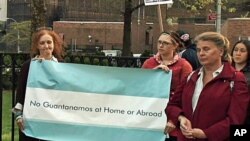On the eve of his trial, American citizen Syed "Fahad" Hashmi has pleaded guilty to one count of conspiring to provide material support to a terrorist organization. In exchange for his guilty plea, U.S. federal prosecutors will not prosecute him on three other counts of conspiracy and material support to terrorism. Hashmi had faced up to 70 years in prison if convicted on all four counts.
Hashmi, 30, a Pakistan-born U.S. citizen who grew up in New York, has been held in pretrial solitary confinement in Manhattan since 2007. On Tuesday, the afternoon before his trial, he appeared in federal court a block away to offer a guilty plea to a single count of conspiring to provide material support to terrorism.
In a written statement, U.S. attorney for the Southern District Preet Bharara said that Hashmi will now face justice for knowingly "giving aid to terrorists whom he knew full well were dedicated to harming Americans."
Hashmi's brother Faisal explains the case began in 2004, when Hashmi was a graduate student in London - and an acquaintance from New York, Junaid Babar, stayed with him during a two-week visit.
"This person showed up in London and didn't have a place to stay, and basically called my brother to ask to stay with my brother," he explained.
According to court filings, Babar brought with him a suitcase containing raincoats, ponchos and waterproof socks that he later delivered to an al-Qaida leader in Waziristan, a part of Pakistan. He also used Hashmi's cell phone to contact another al-Qaida member.
Babar pleaded guilty in 2004, and became a cooperating witness, testifying in terrorism cases in Britain and Canada in exchange for favorable treatment. He was expected to be the main witness against Hashmi.
The case has become a cause célèbre among liberal justice groups who object to the conditions of Hashmi's pretrial confinement. Hashmi has been in his Manhattan cell 23 hours a day and alone at all times for almost three years.
Political science professor Jeanne Theoharis taught Hashmi at Brooklyn College and helped to organize the campaign to publicize his case, including a recent fundraiser in Manhattan.
She says the conditions of his jailing are a form of torture.
"These kinds of conditions are inhumane, they violate international standards, they compromise people's ability and Mr. Hashmi's ability, to participate in his own defense," said Theoharis. "And frankly, they are un-American."
Tony Barkow, a former U.S. attorney in the Southern District of New York, disagreed. He noted that courts have consistently found that conditions like those in Hashmi's case do not constitute "cruel and unusual punishment."
"Whatever the psychological literature or opinion might be, the law is that those conditions don't violate the Constitution and don't violate the law and don't violate his rights," noted Barkow.
The prosecution had argued in court that the conditions are necessary to protect the public, by cutting off any chance that Hashmi could communicate to the outside. Whether Hashmi will continue to be held in extreme solitary confinement after his sentencing in June will likely be the next focus of the support group that has held regular vigils in his behalf outside the Manhattan jail.




